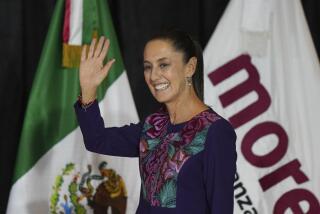Grand Larceny at the Polls
- Share via
Ferdinand E. Marcos has devoted the greater part of his 20-year presidency to plundering the economy of the Philippines and corrupting its civic institutions. Now, in an ultimate act of greed and larcency, he is brazenly seeking to hijack the expressed hopes of the Filipino people for a return to democratic rule.
The flagrancy of the electoral cheating attempted by Marcos forces has been staggering. Thousands of voters who supported Marcos’ opponent, Mrs. Corazon Aquino, went to the polls only to find that their names had been stricken from the rolls. Other pro-Aquino voters were intimidated and in some cases murdered. Ballot boxes were openly stolen. Computer operators working on the official tally walked off their jobs in dismay after finding that vote totals were rigged in Marcos’ favor. All this occurred before the eyes of 600 foreign reporters and scores of American and other international election observors.
According to the independent citizens commission known as NAMFREL, which bases its vote count on carbon copies of precinct returns, Aquino has been winning the election. But the only count that finally will matter is the official one conducted later this week by the National Assembly, two-thirds of whose members are Marcos supporters. There is no doubt what their conclusion will be.
Neither can there be any doubt that Marcos emerges from this election weaker and more isolated than at any time in his presidency. From all the evidence, he is opposed by a majority of Filipinos, by the influential Roman Catholic hierarchy, by most of the business community, even by a significant part of the military’s officer corps. His continued rule will be without legitimacy, and with that rule can be expected a further deepening of his country’s very great economic, political and security problems.
It is a sad truth in international affairs that governments are obliged to deal with other governments as they are, not as they would like them to be. It is no less true that necessary relations with unpalatable regimes can be conducted in ways that give no hint of approval, support or commitment. The United States should promptly and publicly make clear its disgust over the means by which Marcos retained his presidency. It should insist that vital reforms be made, and use its influence on other countries and on international lending agencies to press for those changes. Above all it should remember that the Marcos regime is destined if not doomed to pass, perhaps quite soon, but that the historic bonds that link the United States and the Philippines will endure. It is those future relations that U.S. policymakers should now keep foremost in mind.
More to Read
Sign up for Essential California
The most important California stories and recommendations in your inbox every morning.
You may occasionally receive promotional content from the Los Angeles Times.













